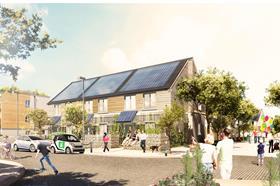Government also makes £10m available for local authorities to prepare brownfield land for homes

The government has launched a £26m fund for starter home pilot schemes.
The fund is open to architects, developers, councils, housing associations and small builders interested in building the first wave of properties under the government’s starter homes initiative.
The Conservatives have pledged to build 200,000 starter homes - homes for first-time buyers given tax incentives to build on brownfield land - by 2020.
Starter homes will be sold at a 20% discount to the market rate. Design guidelines drawn up by architects including Terry Farrell were published before the election (example design by Terry Farrell pictured).
The £26m fund will be used to acquire brownfield sites to provide land for starter homes, with money from the sales of the sites to go back to the government.
In a further move, the government has also made available £10m for local authorities to prepare more brownfield land for the development of starter homes.
Announcing the funding, communities secretary Greg Clark said: “This competitive fund will build homes that will clearly show the wide range of new properties that will be available for first-time buyers as they take their first step on the housing ladder.”
Housebuilders Crest Nicholson and Countryside Homes both welcomed the announcement. Stephen Stone, chief executive at Crest Nicholson: “Today’s announcement will not only help first time buyers get onto the property ladder, but it will also accelerate further output across the industry at a time when housing need is at an all-time high.”
Ian Sutcliffe, Group Chief Executive of Countryside Homes, said: “Countryside is very happy to support this exciting new initiative to increase home ownership opportunities.”
Commenting, RIBA president Stephen Hodder said: “The RIBA welcomes this first step towards increasing the availability of new homes for first-time buyers.
“The Government must work with architects, developers and local communities to ensure that these new homes meet high standards of design and remain affordable.
“It’s vital that a desire to sell at below market rate doesn’t lead to small, poor quality homes in areas without sufficient infrastructure, that’s why we believe it’s imperative that the new national space standard - which come into effect in October - is applied to all new-build homes.”
KPMG’s head of housing Jan Crosby said: “The introduction of the Starter Homes scheme certainly appears to be an encouraging initiative to make home ownership more affordable for young people. However, there’s currently a lack of detail; it would certainly be helpful to see a timescale for when the first starter homes will be available and how many will be built per year to reach the target of 200,000 by 2020.
“An area where more reassurance is needed now is the impact on affordable homes. Starter Homes are going to be partially funded by the exemption of provision of affordable homes, which essentially amounts to a drop in funding. With the social and affordable housing sector already hard hit by measures announced in the Budget, such as rent decreases and Right to Buy, this seems like another blow. What we need is a commitment from Government that social and affordable homes will be funded in other ways, to ensure we are continuing to house those for whom home ownership is simply not a reality.”



























No comments yet